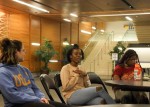This post was updated Feb. 13 at 1:38 p.m.
A student organization aims to provide healing spaces for students to discuss issues within the pan-African LGBTQ community.
BlaQue runs programming through the LGBT Campus Resource Center to host study halls and other outreach events throughout the year, and participates in an annual conference that aims to unite black students across the LGBTQ spectrum through workshops, keynotes and activities.
Azisa Todd, a third-year gender studies student and BlaQue co-chair, said she thinks students need spaces on campus to have intimate conversations about their identities and experiences.
“Visual eye contact, when you see someone changing (their expression) – that’s very affirming, so that’s a form of healing,” she said.
She added that small group discussions can allow students to share personal stories they do not necessarily want to share with larger crowds.
Nyala Tringali-Carbado, a co-chair of BlaQue and fourth-year African American studies and history student, said BlaQue has given them a space to express themselves to a diverse and supportive community.
The organization recently teamed up with the Bruin Consent Coalition to present a joint event, Cross Cultural Healing Space, on how to heal from sexual and gender-based violence in their communities. The discussion, which was held Jan. 29 in Pauley Pavilion, centered around recent events, such as transphobia in the current political climate, a documentary about the alleged predatory behavior of R&B singer R. Kelly and U.S. Secretary of Education Betsy DeVos’ proposed changes to Title IX procedures.
Participants discussed how the proposed Title IX changes, which would provide greater protections to those accused of sexual misconduct, could affect members of their communities.
Tringali-Carbado said although they believe UCLA will not implement the suggested rule changes, it’s still important to identify how their community can push back and support groups who might be affected by these changes.
Paulette Orhii, a second-year human biology and society student and BCC co-director, said the goal of the event was to inform students about these recent events and show solidarity with members of BlaQue’s community.
“People took away a sense of hope because that’s really what the event was about. Their experiences are valid and sharing them can be healing as well,” she said. “Being able to be vulnerable in that type of space has value, it’s activism in and of itself.”
BCC is an undergraduate student organization committed to raising awareness of and educating students about sexual violence while creating a supportive environment for survivors of sexual violence and sexual assault.
Todd said she thinks it is important to have a safe space where people can open up without feeling judged and learn the tools necessary for healing.
“Whatever’s said in there, stays in there,” she said.
Todd added that BlaQue has historically provided a safe space at UCLA in which being black, queer and transgender do not have to be separate identities.
Orhii said despite the traumas that she thinks people of color, queer and genderqueer people are facing under President Donald Trump’s administration, coming together to discuss and unpack them can give the community hope.
She said she hopes BCC continues to collaborate with other organizations on campus, specifically historically marginalized communities because they are disproportionately affected by sexual violence. She added BCC would like to replicate these types of events in the future.
Todd added BlaQue hopes to continue growing its community and fostering a strong sense of solidarity within the group.
“We want to open it up to our allies who want to know more,” Todd said. “We invite folks who reached out to us who don’t necessarily identify as queer or trans to just come in and see what we are about.”
